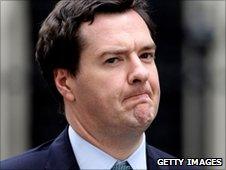Government warned over CGT rise
- Published

Chancellor George Osborne will deliver his first Budget on Tuesday
Raising the rate of capital gains tax (CGT) could result in a fall in tax revenues, a think tank has warned.
The government is widely expected to raise CGT in Tuesday's Budget.
But the Adam Smith Institute said the move could cost the government up to £2.48bn in lost revenues by discouraging individuals from selling assets such as property and shares.
A group of 110 entrepreneurs has also warned the Chancellor that raising CGT could drive investment overseas.
CGT is charged on the profits made through selling assets. Last year it brought in £7.8bn in tax revenues.
Chancellor George Osborne is expected to raise the rate from the current 18% to something nearer to income tax rates - a Liberal Democrat policy which caused serious concerns among backbench Tories.
'Not terribly smart'
The aim of the move is to raise money to help cut Britain's deficit but Peter Young, from the Adam Smith Institute, told the BBC it could actually have the opposite effect.
"It seems that for every 1% rise in the capital gains tax rate above a certain fairly low level of around 10 %, you get a 2% drop in revenue," he said.
"So if you put the rate up by less you'll get a bit less revenue and if you put the rate up by a lot you'll get a lot less revenue, which means that it doesn't seem a terribly smart thing to do at this time because it will widen the deficit rather than bring it down."
The think tank said that when CGT was cut in Ireland from 40% to 20% in 1997 it actually led to a near-tripling of the tax revenue.
Conversely, it said an increase of the size anticipated in the Budget could leave a hole in government finances equivalent to having to cut an additional 30,000 public sector jobs.
The warning was echoed in an open letter to Mr Osborne written by a group of entrepreneurs, who said that while they supported the effort to prevent wealthy individuals avoiding tax by "disguising" income as assets, a blanket rise in CGT "could have a significant long-term detrimental effect on entrepreneurial activity in the UK".
"The net effect of a unilateral CGT tax hike in the UK would drive talented executives abroad and discourage international investors from placing equity investments in the UK, resulting in reduced growth, less entrepreneurship, fewer jobs and of course, reduced tax revenues," they wrote.
"We would therefore urge the chancellor to consider zero-rating CGT for all types of genuine equity investments or start-up incentive schemes, provided assets and options have been held for a significant period of time, such as 12 months or more.
"Such a policy would help the UK become the natural home for innovative entrepreneurial start-ups, creating new jobs and delivering long term recurring tax revenues."
In the last Budget in March, the previous government announced extra relief for entrepreneurs, by creating a new CGT lifetime allowance of £1m taxed at a lower rate of 10%.